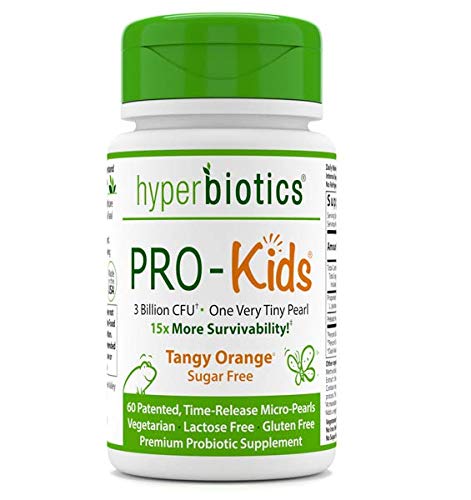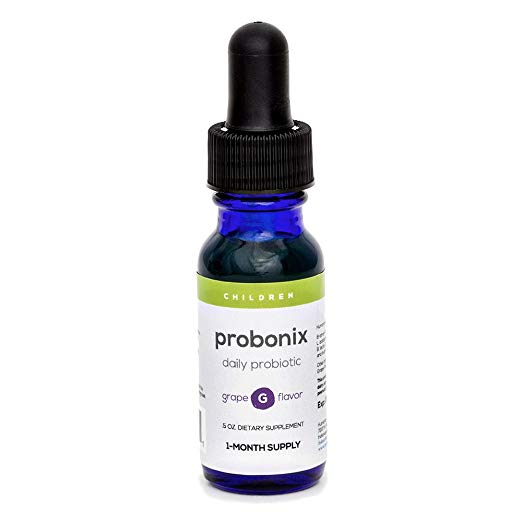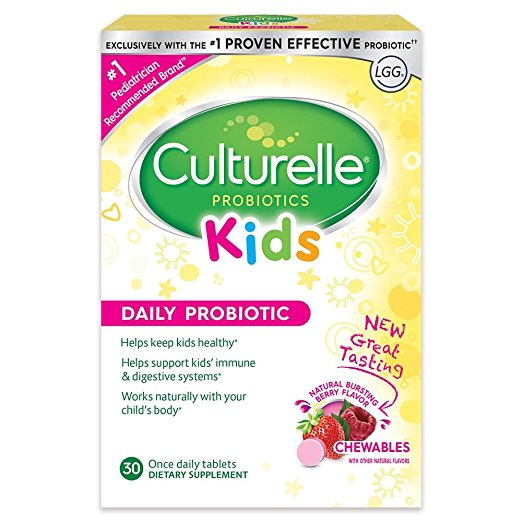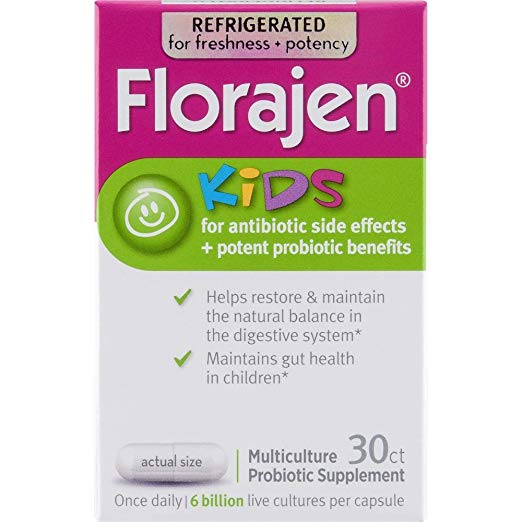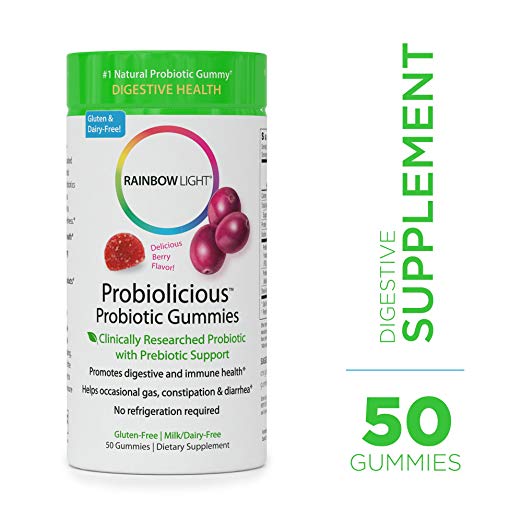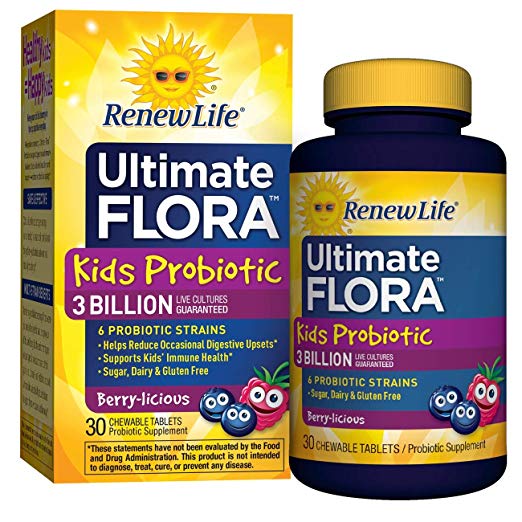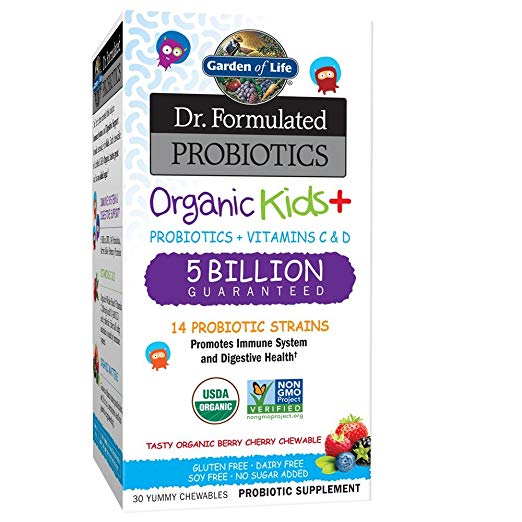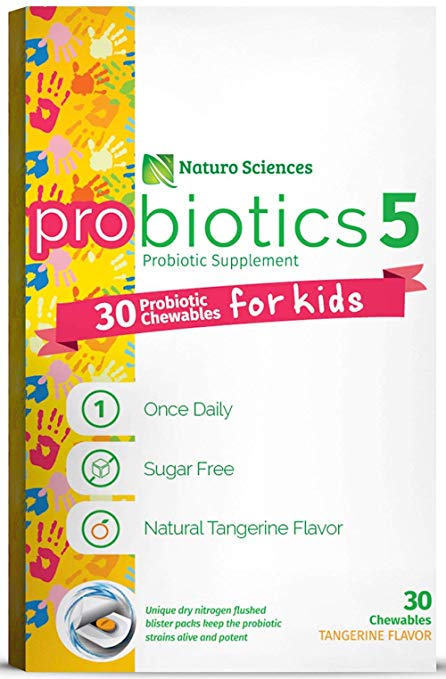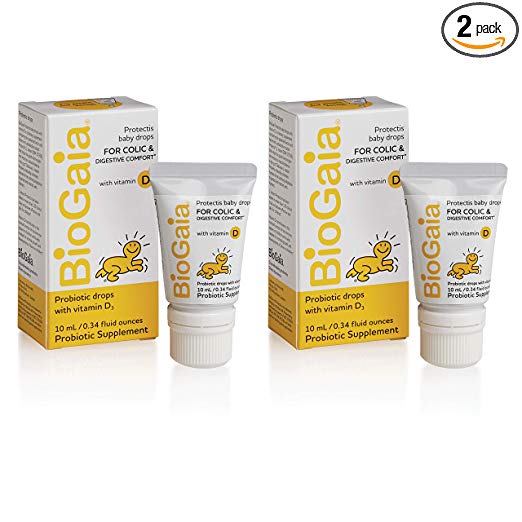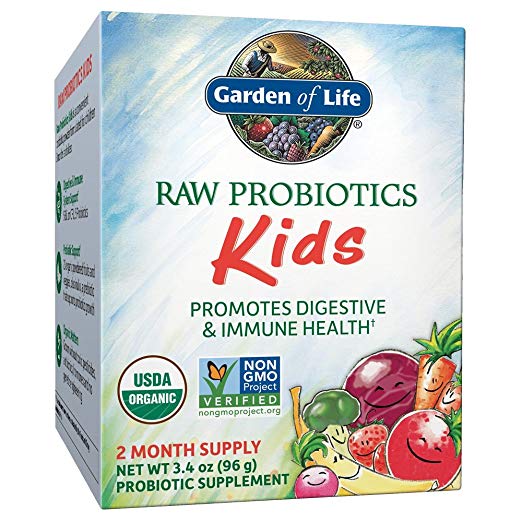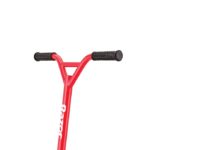Over the past few years, gut health has been linked to good health. Increasing the amount of good bacteria in your gut (also known as probiotics) which can fight bad bacteria that can result in improved digestion. But that’s not all it can do. Studies have shown that certain strains of probiotics can also help in promoting oral health, preventing allergies and colds, and even treat and prevent vaginal and urinary infections. Research also suggests that taking probiotics can help individuals with colic or eczema. Of course, it’s not easy to get your kid to eat food rich in probiotics such as sauerkraut, yogurt, or kimchi (Korean fermented veggies). So, we give them the next best thing – probiotic supplements. Below are the best and safest probiotic for kids.
Hyperbiotics PRO-Kids
Not all kids can take pills so these “pearls” of probiotics are just the thing. Each pearl contains 3 billion CFU of probiotics which include L. plantarum, L. acidophilus, B infantis, and B lactis. Not only that, these pearls also contain a naturally derived prebiotic to encourage the growth of the bacteria in your child’s colon. It has a controlled-release delivery, enabling the pearl to slowly release consistent levels of “goodies” into your child’s digestive tract as it travels. And it is vegetarian, non-GMO, and free of lactose, gluten, and yeast. It also does not contain soy, sugar, iron, nuts, artificial flavors, artificial colors, or preservatives. However, some kids do not like the taste at all, especially if they chew them. While small, some kids still have difficulty swallowing the pearl. And heads up to parents, this one contains dairy.
- 100% natural
- controlled-release delivery
- vegetarian
- doesn’t taste good
- not all kids can swallow the pearl
- contains dairy
Children’s Probonix
The Children’s Probonix is in liquid form which may be much easier to administer than pills, chewable or not. What we actually love about this probiotic supplement is that it contains 8 strains of probiotics – L. rhamnosus, L. acidophilus, B. bifidum, B. breve, B. infantis, B. lactis, B. longum, and L. reuteri. It also contains Tartaric Acid and Inulin Prebiotic. Each bottle contains 45 billion CFUs which is a lot. However, there is no breakdown of what the CFUs are for each strain and how many CFUs there are per drop. It doesn’t taste like grape like the label says. Plus, this is a bit on the expensive side.
- 8 probiotic strains
- Liquid form
- 45 billion CFUs
- No info on how much CFU per strain and per drop
- Doesn’t taste like grape
- A bit pricey
Culturelle Kids Chewables
The Culturelle kids Daily Probiotic is a chewable tablet that contains Lactobacillus rhamnosus G. All 5 billion CFUs which is quite a lot. We’ve found that a lot of kids like or can tolerate the berry taste compared to other probiotics. Also, the tablets are dairy-free and gluten-free but not totally sugar-free since it contains sucrose (an insignificant amount). Even better, this is one of the brands of kids’ probiotics that have been tested. However, it is quite pricey. And it only contains one strain of probiotics.
- 5 billion CFUs
- dairy-free and gluten-free
- clinically tested brand
- expensive
- only one strain of probiotics
Florajen Kids Probiotics
The Florajen Kids Probiotics has more than 6 billion live cultures per capsule. Each capsule contains B. lactis Bi-07, B. lactis HN019, L. acidophilus NCFM, and L. rhamnosus HN001. What we absolutely love about this probiotic capsule is that you can open it up and sprinkle the powder into cold food and drinks or powdered formula if your child is unable to swallow a capsule yet. However, it requires refrigeration to retain its potency. And it is a bit expensive. Plus, shipping this in the summer isn’t ideal.
- 6 billion live cultures per capsule
- can be sprinkled as powder
- allergy-free, gluten-free, dairy-free, kosher, and non-GMO
- requires refrigeration
- expensive
- not ideal for shipping in the summer
Rainbow Light Probiolicious Gummies
The Rainbow Light Probiolicious Probiotic Gummies is a shelf-stable, gluten-free, soy-free, dairy-free probiotic supplement. It also does not contain yeast, fish, shellfish, and nuts. It’s definitely the allergy-friendly option. These supplements contain 1 billion CFU of Bacillus coagulans per serving (2 gummies) along with prebiotics from inulin and fructooligosaccharides (FOS) that help restore natural digestion. However, it does tend to stick together when shipped during the summer to locations with a hot climate. It does contain 1g of sugar.
- gummies form
- allergy-friendly
- tastes great
- tends to stick together in hot weather
- contains sugar
- only contains 1 billion CFUs
ReNewLife Ultimate Flora Kids Probiotic
The berrylicious flavor is what may make your kid love this probiotic supplement. But for parents? It’s the amount of kid-friendly probiotic strains within. Each capsule has 3 billion live cultures that contain Lactobacilli, Bifidobacteria, and Bacillus coagulans. And if your kid has allergies, you’ll be glad to note that these are dairy and soy free. The supplements have been naturally sweetened with xylitol. There are no artificial flavors, sweeteners, and colors. However, they are a bit expensive and some kids found them hard to chew.
- 3 billion live cultures
- 6 probiotic strains
- dairy and soy free
- expensive
- may be hard to chew for some kids
Garden of Life – Dr. Formulated Probiotics Organic Kids+
The Dr. Formulated Probiotics Organic Kids+ from Garden of Life is one of a handful of brands that are Certified USDA Organic. It contains 14 probiotic strains (5 billion CFU) as well as vitamins C and D. Like some of our other picks, it does not contain dairy, soy, or gluten. These supplements also contain an organic prebiotic blend that includes organic Acacia (A. Senegal) fiber which helps good bacteria in your child’s digestive tract thrive. However, they don’t really taste all that good. The tablets get easily broken inside the bottle and they’re quite big.
- vegetarian
- Certified USDA Organic
- 14 probiotic strains
- doesn’t taste good
- tablets get easily broken
- tablets are a little large
Naturo Sciences Children’s Chewable Probiotic
These chewable probiotic supplements from Naturo Sciences contain 5 billion CFU of 8 probiotic strains as well as a prebiotic blend and vitamin C. The strains included are Lactobacillus acidophilus LA-14, Bifidobacterium lactis BI-04, Lactobacillus plantarum LP-115, Lactobacillus salivarius LS-33, Lactobacillus paracasei LPC-37, Lactobacillus rhamnosus GG, Lactobacillus casei LC-11, and Bifidobacterium long BI-05. The natural tangerine flavor seems to be enjoyed by a lot of kids. However, it is not a small pill. It is not labeled gluten-free, soy-free, or nut-free so this may not be ideal if your child has allergies.
- tasty flavor
- 5 billion CFU; 8 probiotic strains
- sugar-free
- pill is a bit big
- Not allergy-friendly
BioGaia ProTectis Baby
The BioGaia Probiotics Drops are perfect for little ones who suffer from colic. It contains L. reuteri which has been clinically tested to reduce crying in colicky babies. The recommended dosage is 5 drops which has 100 million CFU. And it includes 400 IU vitamin D. And this supplement is quite safe even for newborns. However, administering the drops isn’t easy. It is quite pricey though a lot of parents believe it is worth the cost since it helps the baby sleep (and them too).
- clinically tested
- includes 400 IU vitamin D
- safe for newborns
- hard to use the tube
- very pricey
Garden of Life RAW Probiotics Kids
This is another Certified USDA Organic probiotic supplements from Garden of Life. The main difference is that the prebiotics here are derived from 23 raw organic fruits and veggies. And then the probiotic blend contains 5 billion CFU with 5 different strains. And it is in powder form which makes it very easy to give to your child. However, it is quite difficult to dissolve; stays a little clumpy so you need to shake/stir it several times. And it changes the taste enough that your kiddo will notice it. Also, it requires refrigeration which makes it hard to get shipped.
- RAW whole foods
- powder form
- Certified USDA Organic
- difficult to dissolve
- affects the taste of the juice/milk/food
- requires refrigeration; not ideal for shipping
Probiotic for Kids Buying Guide:
You’ve probably heard all about probiotics and how gut health can lead to good health. And if you’re not picky about food, you can get all the probiotics you need by ingesting sauerkraut, yogurt, kimchi, or other probiotic-rich foods. However, kids are another matter. Since it can be quite a challenge to get your kid to eat healthy, it’s bound to be more difficult to get them to regularly eat foods like the ones we’ve mentioned. Which means getting them some probiotic supplements. Now, it’s quite easy to just get on the bandwagon without doing any research. And, for the most part, you won’t go wrong giving your child some probiotic supplements. However, to be on the safe side, it’s best that we, as parents, learn more about the wonderful world of bacteria and how to choose the best ones for our children.
What are probiotics?
According to the American Academy of Pediatrics, probiotics are “supplements containing organisms that change the microflora of the host.” In much simpler terms, these are good bacteria that are the same or similar to the ones found in your gut. Now, a human’s digestive tract is home to a diverse and complex community of microorganisms, both “good” and “bad” bacteria. If you have too much “bad” bacteria which is often caused by an unhealthy diet, this imbalance can cause diarrhea, constipation, skin conditions, weight gain, brain fog, UTIs, fatigue, and other chronic health conditions. Ingesting good bacteria can ensure that there’s a healthy balance of “good” and “bad” bacteria in your intestines.
Should my child take probiotic supplements?
In general, probiotics are safe for children to take. However, there are different types of probiotics and each type has different strains. All of these work in different ways and provide various health benefits. The most common good bacteria you’ll find in probiotic supplements are Lactobacillus species, Bifidobacteria, Saccharomyces boulardii and Bacillus coagulans. Most of these are naturally found in the human gastrointestinal tract.
It may be a good idea to give your child probiotic supplements if he or she is unable to consume dietary sources of probiotics such as yogurt, kefir, sauerkraut, and kimchi. Or, if you are unsure of the type and amount of probiotics your child in ingesting in these foods. With a supplement, you can control exactly what type and how much probiotics your child is getting. However, it is recommended that you consult with your pediatrician first before you start administering probiotics.
Liquid, powder, or tablet form? Refrigerated or shelf-stable?
It generally does not matter what form you take as long as these contain the right strain in the right amounts. As for refrigerated vs shelf, always choose the refrigerated products. This is because those often contain more strains in higher amounts. The Naturo Sciences Children’s Chewable Probiotic is shelf-stable while the Florajen Kids Probiotics requires refrigeration.
Which probiotic is the best?
There is no actual “best” probiotic since each bacteria has distinct properties and acts differently within the digestive tract. Because of this, the choice of which probiotic will work best with your child will depend on the reason why he or she needs to take it. Do the research and check which ones have been studied and proven to be effective in treating or boosting certain health conditions. Make sure that you get the genus, species, and strain correct. As we’ve mentioned, it’s important that you get approval from your child’s pediatrician before offering supplements to your kid.
So, what does the research say?
While there are still a lot of questions regarding probiotics, studies have shown the benefits of ingesting certain strains. Take note that the research into the efficacy of probiotics is still ongoing so do not take this as a specific diagnosis and treatment plan for your child’s situation. It’s still best to first consult with your doctor.
Antibiotic-associated diarrhea
Antibiotics kill bacteria indiscriminately which means there’s a good chance that the number of good bacteria in your child’s gut has gone down which can lead to diarrhea. According to research, the strains Lactobacillus rhamnosus GG (aka LGG), Lactobacillus reuteri protectis, and Saccharomyces boulardi have been found to be effective in treating antibiotic-associated diarrhea. The Culturelle Kids Chewables contains 100% L. rhamnosus GG and has been tested to effectively reduce the symptoms of diarrhea.
Intestinal Problems
Some studies have shown that Lactobacillus reuteri DSM 17938 have been effective reducing the symptoms of irritable bowel syndrome, ulcerative colitis, and Crohn’s disease such as bloating, abdominal pain, gas, and/or diarrhea.
Pro Tips in Choosing Probiotic Supplements:
Check the strain of probiotic and expiration date.
We’ve already mentioned that different strains have different health benefits. Some will work better in treating certain ailments and conditions. Make sure that you check the label of the supplement to see what specific organisms are present. Any probiotic supplement that does not list the strain should be avoided. All of our picks like the Hyperbiotics PRO-Kids list their ingredients on the packaging.
In addition, probiotics are living organisms. Like perishable food, these supplements have an expiration date. The amount of live bacteria in the supplement may go down as the expiration date gets nearer.
Identify the CFU’s
CFU is short for colony-forming units. This will tell you just how much bacteria is present in each dose. How much CFU your child needs will depend on the strain and the condition you want to treat. Again, it’s best to consult with your doctor in order to get the best results. More CFUs isn’t always better. Also, take note that what’s on the label may not be accurate since live bacteria can die during the packaging and shipping process. The Children’s Probonix, for example, lists that it contains 45 billion CFUs.
Look for the company’s contact info.
It should be on the packaging. Getting in touch with the manufacturer can help you get answers for any questions you have regarding their product such as how much to give and the actual CFU. If you can’t find the contact information of a manufacturer on the packaging, it’s best to steer clear of that product altogether. The Naturo Sciences Children’s Chewable Probiotic has their contact information included on their packaging.
Check other ingredients.
Look at all the ingredients used in the probiotic supplement. Make sure that there are no ingredients included that your child is allergic to such as dairy or soy. The Rainbow Light Probiolicious Gummies is one of several on our list that are allergy-friendly.





